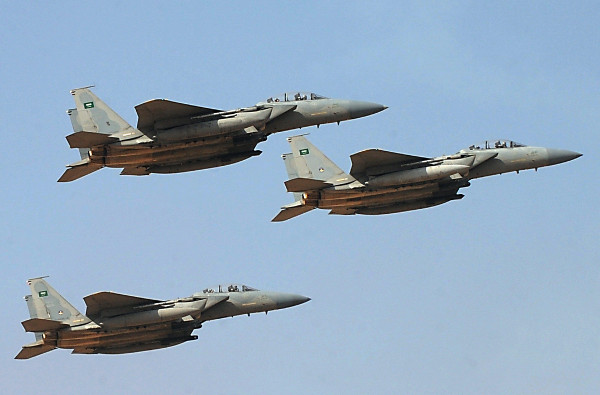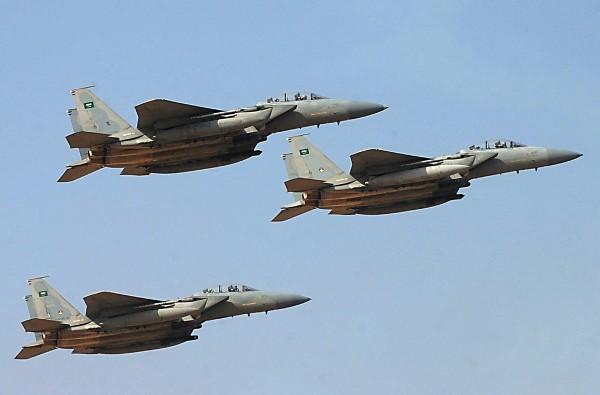

By: Agencies
Source: MWC News
Saudi airstrikes on Shia rebels in Yemen have triggered a furious reaction from regional rival Iran, with top officials warning that military action could spill into other countries.
Saudi Arabia said that a coalition consisting of 10 countries, including members of the Gulf Cooperation Council (GCC), had begun airstrikes at 2am local time on Thursday, targeting Houthi positions in the capital, Sanaa.
According to sources, the strikes carried out by 100 jets from Saudi and its coalition, have destroyed Iranian-made missile launchers in the capital Sanaa.
Houthi military barracks and air base controlled by the rebel group were also reportedly destroyed, Fayez al-Duweiri, a retired Jordanian general and defence analyst, said.
The Houthi-run health ministry in Sanaa said that at least 18 civilians were killed and 24 others were wounded in the Saudi-led attacks on the capital.
The bombing of the Houthis, who are said to be backed by Iran, a charge Tehran denies, came after several weeks of warnings that Yemen was descending into civil war.
Saudi Arabia said it had launched the bombing raids to reinstate what it called the legitimate government of President Abd-Rabbu Mansour Hadi, who has been holed up in the main southern city of Aden since fleeing rebel-controlled Sanaa.
The Houthis and their allies within the armed forces had been closing in on Hadi’s last bastion Aden.
Iranian Foreign Minister Mohammad Javad Zarif said the air strikes would lead only to greater loss of life.
“Military action from outside of Yemen against its territorial integrity and its people will have no other result than more bloodshed and more deaths,” he told the Iranian-owned Al-Alam television channel.
“We have always warned countries from the region and the West to be careful and not enter shortsighted games and not go in the same direction as al-Qaeda and Daesh,” he added, using the Arabic acronym for the Islamic State of Iraq and the Levant (ISIL) group.
He also called for an “urgent dialogue” among the Yemeni factions “without external interference.”
The comments from Zarif, who is in the Swiss city Lausanne for talks with US Secretary of State John Kerry on Iran’s contested nuclear programme, echoed condemnation of the Saudi-led strikes by officials in Tehran.
Speaking from Sanaa, Houthi spokesman Mohammed Al Bukhaiti called the military action a declaration of war on Yemen, adding that reports alleging a Houthi leader, Mohamed Ali Al Houthi, had been injured were false.
Meanwhile, thousands of pro-Houthi protesters gather in Sanaa on Thursday to condemn the Saudi-led air strikes. In the city of Taiz, supporters of President Hadi also organised a rival protest.
Sanaa targeted
Huge explosions were heard in Sanaa as strikes hit an airbase at the capital’s airport and other locations in the city, an AFP correspondent reported.
Strikes were also reported on targets in the Malaheez and Hafr Sufyan regions of Saada province, a main Houthi stronghold on the border with Saudi Arabia.
Citing Saudi military sources, Saudi-owned Al Arabiya TV channel reported that 100 Saudi warplanes were involved in the operation, dubbed ‘Decisive Storm’.
The United Arab Emirates is participating with 30 jets, Bahrain with eight, Morocco and Jordan both with six. Sudan reportedly offered three war planes to assist the operation, Al Arabiya reported.
Jordan confirmed that it was participating in the offensive.
An Egyptian official told the AFP news agency that Egypt would also take part. Saudi Arabia said that another four Muslim countries including Pakistan wanted to participate in the Saudi-led military coalition.
Kuwait’s defence ministry announced it was sending three squadrons of its F-18 Super Hornet aircraft to Saudi’s King Abdulaziz airbase in Dhahran to take part in the offensive.
Four Egyptian warships also entered the Suez Canal on Thursday en route to the Gulf of Aden after Cairo pledged military support for the campaign, canal officials said.
The officials said the ships will take part in operations “to secure” the strategic waters that control southern access to the Suez Canal.
Pakistan, which has longstanding ties to Saudi Arabia, was examining a request from Riyadh to join the coalition, Islamabad said.
“I can confirm we have been contacted by Saudi Arabia in this regard. The matter is being examined,” foreign office spokeswoman Tasnim Aslam said.



